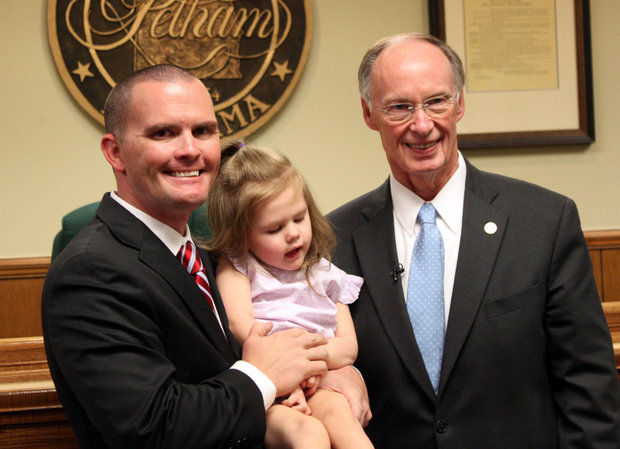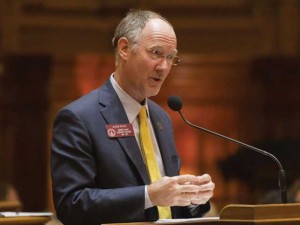In Georgia, two of the most disputed matters from this year’s Georgia legislative session, medical cannabis and a private-insurance mandate for autism, remain on the docket for 2015. In an interview this week with Speaker David Ralston, he predicted an easy time in his chamber for one of those issues, but not necessarily the other.
Last year’s medical cannabis bill, aided by recent studies on the therapeutic aspects of CBD, gained strong momentum over the course of the session but eventually stalled. That was in large part because the Senate attached to it a separate bill, opposed by the House, to mandate autism coverage by private insurance plans. The House disagreed with that combination, and both efforts died.
HB 1, pre-filed by Rep. Allen Peake, R-Macon, would allow the parents of children who suffer severe seizures to have access to cannabidiol oil, which is made from an extract of the cannabis plant and has been effective in reducing the number and severity of seizures in some children.
Ralston said:
“I really, fervently hope that — and I expect — the House will move House Bill 1 quickly. And I hope the Senate will look at that issue on its own merits and join with us in passing that bill. Representative Peake has done as good a job pushing a piece of legislation as I’ve seen in a lot of years around this building. He brings great passion and just heartfelt concern for these families on this issue. But he’s done his homework. And I think you’re going to see a very well thought-out and very well put-together bill and I’m hoping we can pass that quickly and get it over to the Senate, and that they will pass it quickly and that we can address that issue.”
In South Carolina, a legislative committee met Thursday to discuss allowing the medical use of marijuana. The panel met to hear testimony in October in Charleston and in November in Greenville. The General Assembly went on to approve a bill this year allowing patients with severe epilepsy to be treated with non-psychoactive cannabidiol, also known as CBD oil, which helps control seizures.
At an earlier meeting, State Sen. Tom Davis of Beaufort said that while doctors can prescribe the oil, there’s no way to legally get it in the state. Similar complaints of federal entities stalling progress exists in other states including Alabama, where Carly’s Law supporters blame FDA for stalling approval of study to treat severe seizures with CBD.

Dustin Chandler of the Birmingham area holds his 3-year-old daughter, Carly, next to Gov. Robert Bentley during a gathering at Pelham City Hall on July 22, 2014, in celebration of the passage of Carly’s Law. Families with children who could benefit from CBD. (Martin J. Reed / [email protected])
The Birmingham-area’s Dustin Chandler, who helped to create the Carly’s Law legislation, posted an “Immediate Call to Action” on Facebook on Wednesday night in response to concerns about the Food and Drug Administration’s apparent lack of response in authorizing the study.
“It has become very apparent the hold up with Carly’s Law study is the Federal Government, specifically the FDA,” Chandler wrote on the Carly’s Law Facebook page, noting there has been no response to UAB for 75 days.
“That’s right, your children have been suffering for 75 days while the FDA ignores UAB,” he wrote.
In an interview on Wednesday night, Chandler said he wants to see Alabama’s federal lawmakers push the FDA into action.
“We understand there are pressing issues, but the lives of our children are more pressing than any other issue they’ve got on their plate,” Chandler said.
While challenges still exist pushing through bureaucratic systems, some across the country continue to push to fill the void and meet the growing demand of parents and families looking for immediate relief.
The Stanley brothers, a five-brother operation in Colorado producing a cannabis-based oil used to treat children with severe epilepsy, is expanding to meet this growing need. Amid a newly formed hemp industry in Colorado and their massive new facility in marijuana-friendly Uruguay, Stanley Brothers Social Enterprises plans to massively expand by summer 2015, possibly allowing it to eliminate a 12,000-person, worldwide waitlist for the therapeutic oil.
Recently, 250 people were told they would soon start getting the oil, called Charlotte’s Web after a Black Forest girl who suffered debilitating seizures before she began using the oil. By the end of January, the brothers plan to supply the oil to about 3,500 people in Colorado and California – a seven-fold increase that would eliminate current wait lists in each state, said Jesse Stanley, one of the brothers.
The new recipients include Tripp Oliver, 6, whose mother moved with him in April from Georgia to Colorado seeking the oil to help with grand mal seizures that hit him once or twice a week. He has been on the list about a year – a wait that ended Tuesday night with an email.
In short: Tripp’s oil will be available for pickup in late December, said his mother, Laura Oliver.
“We have been waiting for this for so long,” Oliver said.
The brothers pioneered a technique to develop cannabis plants with low-psychoactive properties that were rich in cannabidiol, or CBD, a substance believed to provide relief for medical conditions such as epilepsy. It has been used by 500 people in Colorado and California and looks to grow substantially in 2015.


